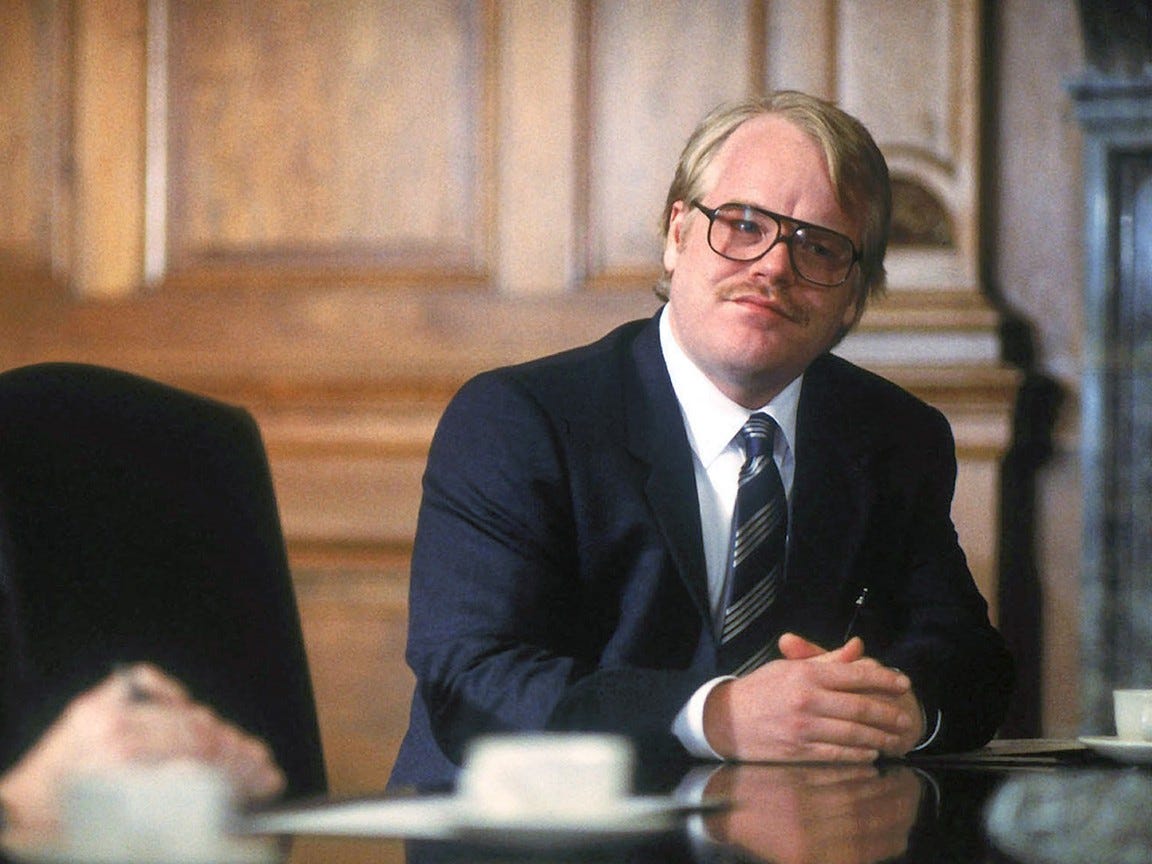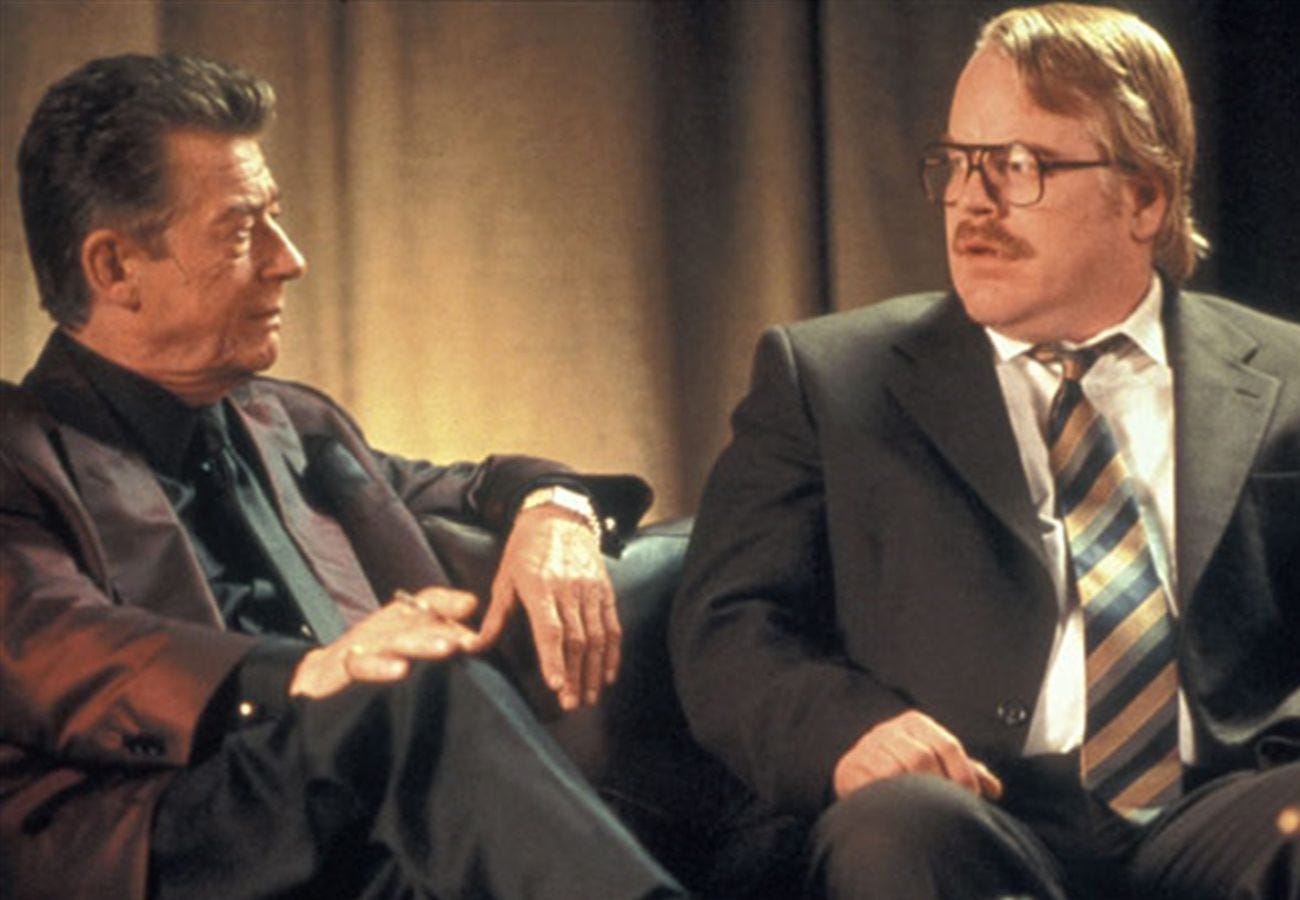‘Owning Mahowny’ at 20: Rolling the Dice with Philip Seymour Hoffman
In an early lead role, Philip Seymour Hoffman explored the mysterious compulsions of a banker who embezzled money to fuel his gambling addiction.
“Do you know why he wants to win? So he has the money to keep losing.” — Maury Chaykin, Owning Mahowny
There’s an essential loneliness to a Philip Seymour Hoffman character, a sense that no matter how many people surround him—or, in the case of The Master, treat him as a prophet—that he’s on an island, isolated by the narrowness of his own obsessions. He’s the sound man secretly pining for Dirk Diggler in Boogie Nights. His iconoclastic writers in Almost Famous and Capote are temperamentally at odds—Lester Bangs the exuberant flamethrower, Truman Capote the odd introvert—but they each cling to a new relationship like a life raft. The maverick CIA operative in Charlie Wilson’s War, the high school teacher with a crush on his student in 25th Hour, the Charlie Kaufman surrogate in Synecdoche, New York: These are not men with families or close friends or anything approaching a conventional, balanced life. They are walking preoccupations.
Twenty years ago, Hoffman took the title role in the Canadian independent film Owning Mahowny. It was just his second lead role (2002’s Love Liza was the other) after exploding onto the scene with supporting turns in four Paul Thomas Anderson films (Hard Eight, Boogie Nights, Magnolia, Punch-Drunk Love), The Big Lebowski, Happiness, The Talented Mr. Ripley, and State and Main. (Let’s pause for breath for a moment and consider Hoffman’s application as the greatest actor of his generation.) Though not as pedigreed as the auteurs Hoffman was working with at the time, the film’s director, Richard Kwietniowski, had gotten some attention for his 1997 drama Love and Death on Long Island, starring John Hurt as a British widower who falls into a romantic obsession with a much younger movie star (Jason Priestley).
Both of Kwietniowski’s features have fallen through the streaming cracks, and Owning Mahowny feels like an obscure line item in Hoffman’s filmography—surely nothing that you would write a 20th anniversary essay about. Yet it remains a sterling example of what Hoffman could bring to a lead role, when his job wasn’t to steal scenes in quick bursts, but to sustain a Hoffman type over the course of an entire film. We can only guess what Hoffman’s supporting characters might be like in moments when they’re not shaking up the action, and here the mysterious compulsions of Dan Mahowny, a modest Toronto banker with a gambling addiction, are laid out for full examination. It is to Hoffman’s credit that we come to know Mahowny so intimately, but feel like some essential piece of him is still an enigma—not least to Mahowny himself.
Based on the true story of Brian Malony—whose $10 million embezzlement scheme was documented in Gary Stephen Ross’ 1987 book Stung, the source for this film—Owning Mahowny opens in early ’80s Toronto, with Mahowny sputtering into a parking deck with a conspicuously shitty car. Despite his post as the youngest assistant manager ever promoted at the bank, Mahowny stands out for his car, his cheap off-the-rack suit, his weathered faux-leather knapsack and a sparsely appointed apartment where the bed barely has a frame. His co-worker and girlfriend Belinda (Minnie Driver) has a high tolerance for his lapses in taste and attention, and even overlooks the likelihood that he gambles a bit too much money at the racetrack on weekends. She tells friends he works too much. Turns out she doesn’t know him well at all.
On weekends, Mahowny pursues the secret half of a double life, taking a short flight down to Philadelphia and the shuttle bus to Atlantic City, where Victor Foss (Hurt), the operator of his favorite casino, notes his gambling habits with keen interest. How does this disheveled rube, drawing $22,000 a year in salary, spending thousands more than that at the tables at his casino? He wants to know, but he doesn’t want to know, either. Back in Toronto, Mahowny’s sterling reputation and easy-going personality gives him the latitude to siphon money off accounts with large lines of credit, which he can then use to pay off his bookie (Maury Chaykin) and chase his losses with more big bets. The thought is that he’s one great run away from solvency or better, but even when he goes on the rare heater, he can never quit while he’s ahead.
Foss cannot believe his good fortune. Mahowny seems to want nothing more from his high-roller trips than a pile of barbecue ribs with no sauce and a Coke. When he sends a call girl up to his room, he turns her away. “No sex, no booze, no drugs,” says Foss with a Mephistopheles grin on face. “Our little roller is a purist. He’s a goddamn thoroughbred. All he cares about is the next hand.”
Mahowny is also the ultimate mark: Predictable, unfussy, determined to stay at the table until he’s lost nearly every chip. When he goes on a run that puts him up several million dollars, betting multiple hands of blackjack at $70,000 a hand, Foss doesn’t betray a hint of concern. “Want to know how we’re doing?,” he tells an underling. “Talk to me at 4 a.m.” Hurt represents the House in all its smug, villainous certainty. There can be only one winner in this showdown and it’s not going to be the lumpen slob from Ontario.
As we would tragically discover a decade later, Hoffman knew a little something about addictive behavior. His Mahowny bets like a junkie in search of some long-ago high that he can never get again, but feels compelled to keep chasing in larger amounts. In a rush between meetings, he hastily bets all the home teams in the National League and all the away teams in the American League—a wager so degenerate that even his low-life bookie feels sick about taking it. In close-up, with a greasy unkempt haircut to match his rumpled suits, Hoffman looks completely locked into the moment as Mahowny, joylessly pushing chips forward and showing little change of expression on the odd occasion when he hauls a winning pot back. Gambling is not a pleasure. It’s simply something he must do.
When investigators finally ensnare Mahowny for his scheme, he’s asked to rate, on a scale of 1 to 100, the biggest thrill he’s had gambling. He answers “100.” Asked then to rate the biggest thrill he’s had outside gambling, he answers “20.” So that’s the rating he must be content with the rest of his life, if he intends to stay out of prison. But Owning Mahowny seems to take place long after he had that 100-level thrill, because there’s not a trace of the exuberance that a younger Hoffman displayed as a young man taunting Philip Baker Hall’s hero at the craps table in Hard Eight. He’s chasing losses, sure, but what would he even do with the money if he won? He doesn’t care about looking fine or getting off, and he isn’t looking to settle down with Belinda, either. So what’s his motivation?
That part is unknowable, to Mahowny as much as anyone else. He doesn’t have the capacity to reflect on his actions. He’s simply compelled to act, mostly unmoved by Belinda’s entreaties that he pay more attention to her—a modest request, given that she appears to require so little. Mahowny is the untalented Mr. Ripley, scrambling to patch up a massive fraud in order to prop up a high-roller persona that was never sustainable. His arrest is the cold splash of water he needs, like a state-sanctioned cold-turkey rehab program, and he can finally come to terms with the damage he’s done to himself and others. That brings out another side of Hoffman, too, who can start to reveal the fact that Mahowny wasn’t always the relentless “thoroughbred” that Foss believed him to be. He cares about more than the next hand, so long as the cards are off the table.






Hoffman was untouchable. I got to see him onstage, playing Jamie in Long Day’s Journey Into Night in an unabridged production also starring Vanessa Redgrave, Brian Dennehey, and Robert Sean Leonard. It was everything you could have hoped for.
Here’s a true story. A good friend of mine understudied for a role in a play that Hoffman was starring in and they become close and stayed close after the show. Let’s call my friend Steve. Hoffman would show up whenever Steve was in a play and vice-versa. Much later, a couple more good friends from my circle were hanging out after work at a very normal East Coast Irish bar watching a West Coast Knicks game late at night. Hoffman came in, sat at the bar by himself, ordered a beer, and settled in to watch the game. My friends recognized him, of course, and though they aren’t the sort to bother celebrities, they felt the need to say hello and mention that they, too, were friends with Steve. Hoffman shook their hands and sang Steve’s praises as an actor and as a person. They watched the game and shot the shit. At some point, my friends asked Hoffman what he was doing at a totally normal Irish bar at an odd hour, watching a basketball game by himself. His response was “I’m working nights these days.”
What he didn’t say, but what my friends well knew, was that his night job was doing Wiley Loman in Death of a Salesman at the Barrymore Theater, directed by Mike Nichols. He had come from the theater to watch some ball after the show before he went home.
His sobriety had been well-publicized, so this wasn’t necessarily a joyous story to hear the next morning, but I still find a lot of joy in it, even though a year later he was gone. He wasn’t just the actor of his generation, even though he was certainly that. He was also a mensch. What a loss.
Unrelated to this (typically excellent) piece by Scott: For those wondering what happened to Kwietniowski, he became a professor at the London Film School. Apparently he's very happy there. LOVE AND DEATH and MAHONEY were both major for me, so while it's my loss, it's definitely the students' gain. https://lfs.org.uk/staff/546/richard-kwietniowski